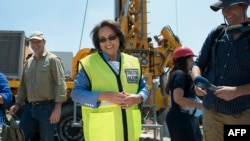The South African port city of Cape Town, which attracts 2 million tourists a year, is facing its biggest water crisis ever.
Mayor Patricia de Lille warned of a dire situation last week as drilling began on a new well that will tap into one of the major aquifers under the city.
"We're losing 1 percent of our dams — 1.5 every week," she said. "Our dams, for the first time, are below 30 percent. And I'm really worried."
Cape Town is one of South Africa’s hottest tourist destination. About 9 percent of the country’s $33 billion dollar economic output last year came from the tourism industry, according to the World Travel and Tourism Council.
Signs at the Cape Town International Airport encourage visitors to help with the city's water saving efforts by not fully opening water taps and only flushing toilets when necessary.
When the levels at the dams gets too low, Cape Town water taps will be turned off. Current estimates put the date that will happen – called "Day Zero" – in mid to late April.
Residents will then have to queue up at water collection sites for water.
"While we are working as hard as we can to bring additional water on board, Capetonians must help us to save water," de Lille said.
That's something some residents are taking seriously as the so-called Day Zero approaches.
“We definitely need to do our part and use as little water as possible, but I do hope that the government is doing something to prevent Day Zero, because it’ll be a national crisis," said Wendy Swiel, Cape Town resident who was getting water at a trial collection site. "It’ll be honestly horrific."
People filling their water bottles at the site were limited to a maximum 25 liters (6.6 US Gallons) per person, per day.
"We can't bathe anymore, we can't," said Susan Jones, another citizen at the test collection site. "We must just shower. And every other day, we shower to save water. But we make do."
But Jeff Levy, who owns a hotel in Cape Town, wishes there were alternatives to having to switch off all the taps and close his hotel when the city runs out of water.
"There are countries in this world that have proven there are ways to deal with drought and with desert regions," he said. "One has to look at the Middle East and see what Israel did to a desert there in respect of desalinization. India is also doing a lot of good work with desalinization."






